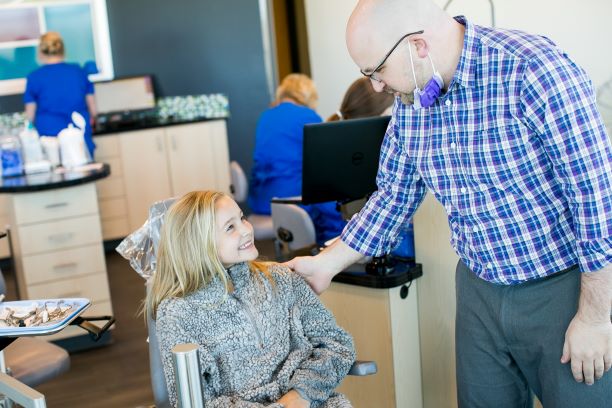October is National Dental Hygiene Month!
October is known for many things: the fall season, Halloween, Pumpkin Spice – but it’s also National Dental Hygiene Month – a time to evaluate our own dental hygiene and focus on healthy habits. This is especially important if you have a young child or teenager. This is the time they start to develop habits that can stay with them throughout their life.
There are four healthy practices to start focusing on as a part of good dental hygiene for your child: brushing, flossing, chewing, and rinsing.
Brushing
Your child may already feel like a pro at brushing their teeth. If they’re brushing at least twice a day, they probably have a pretty healthy smile. But it’s important to talk about the way to brush teeth. It’s easy to think there isn’t a certain way to brush teeth, but if you are brushing your teeth in a way that could damage teeth, it can do more good than bad. Bad brushing habits can be harmful to teeth in the long run, even if you can’t see the immediate effects. If your child wears braces, not brushing their teeth well enough can lead to discolored teeth when the braces are removed, as well as inflamed gums and other issues.
- Place your toothbrush at a 45 degree angle to your gums
- Use short strokes (about tooth-wide) in back and forth motion
- Brush all surfaces of your teeth – outer, inner, and chewing surfaces. Brush your tongue to remove bacteria that can cause bad breath
- Brush your tongue to remove bacteria that can linger there and ensure fresh breath
- Never brush too hard – this can cause your enamel to wear down overtime
- Brush with a fluoride toothpaste
Flossing
You may feel like it’s hard to get your child to floss and some people tend to forget about the benefits of flossing. Flossing helps remove bits of food that can linger in between and behind teeth, and a toothbrush alone won’t always remove them. If these food particles are not removed, this leads to the buildup of plaque and cavities will form. Try to get your child in the habit of flossing at least once a day before going to bed. A tip you can try is setting dental floss out on their night stand or bathroom sink.
If your child wears braces, it is even more important to start flossing to remove food debris. There are several different types of floss and flossing tools for braces that you can get at your nearby drugstore, but waxed floss is best to move easier around braces. Your local orthodontist for kids can show your child the best way to floss with braces.
Rinsing
Rinsing with mouthwash can further help with excellent oral hygiene by killing bacteria that can lead to bad breath, prevents plaque, tooth decay, or gingivitis. If you have concerns about what types of mouthwash to use, look for the American Dental Association Seal of Acceptance. Using a mouthwash acts as another layer of defense for your teeth and is a great addition to your dental care routine!
Chewing
You may not think about it, but chewing can be a key part of your dental hygiene. According to MouthHealthy.org, chewing sugarless gum can improve your dental health by increasing the flow of saliva. Saliva helps to wash away food debris and can neutralize acids in the mouth causes by bacteria. Additionally, saliva contains calcium and phosphate that helps strengthen tooth enamel. To find a sugarless gum, look for one with the American Dental Association Seal.
At White, Greer, & Maggard Orthodontics, we care about our patients’ at-home oral health We offer early adolescent and adult orthodontic treatment as well as braces and Invisalign. We have several offices throughout Kentucky, including offices in Lexington, Louisville, Danville and more. Contact us to schedule an appointment!
